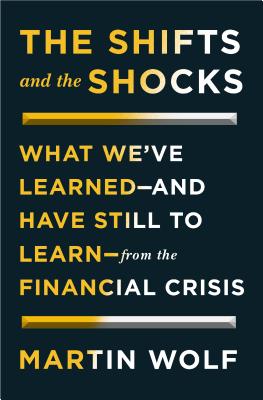
 Martin Wolf is the associate editor and chief economics commentator at the Financial Times, London. He is the recipient of many awards for financial journalism, for which he was also made a Commander of the Order of the British Empire in 2000. His previous books include Fixing Global Finance and Why Globalization Works.
Martin Wolf is the associate editor and chief economics commentator at the Financial Times, London. He is the recipient of many awards for financial journalism, for which he was also made a Commander of the Order of the British Empire in 2000. His previous books include Fixing Global Finance and Why Globalization Works.
About The Shifts and the Shocks: What We’ve Learned–and Have Still to Learn–From the Financial Crisis
We have been inundated with books about the “financial crisis.” Surely, there is little more to be said. Martin Wolf agrees. In fact, he argues, too much has been said about the purely financial aspects of the crisis, important though they are. The underlying problem is that the world economy is unable to cope with the major shifts it is undergoing: rapid economic integration, competition from billions of new workers, technological revolutions, and the floods of capital across the world. These shifts have transformed relationships among economies and within them, creating new competitors, huge imbalances, and huge increases in inequality.
 With those shifts have come vast and largely unforeseen financial shocks. The breakdown of the financial system in the high-income countries of the West was a symptom of unsuccessful, incomplete, and misguided adjustments to the imbalances created by this new world. The shocks are partly the result of the financial system’s frailties, which must be remedied durably and radically. But they are also the consequence of deeper economic forces. To focus only on the financial breakdown is to mistake symptoms with causes. As important as improving the financial system is making the global economic system more stable.
With those shifts have come vast and largely unforeseen financial shocks. The breakdown of the financial system in the high-income countries of the West was a symptom of unsuccessful, incomplete, and misguided adjustments to the imbalances created by this new world. The shocks are partly the result of the financial system’s frailties, which must be remedied durably and radically. But they are also the consequence of deeper economic forces. To focus only on the financial breakdown is to mistake symptoms with causes. As important as improving the financial system is making the global economic system more stable.
The Shifts and the Shocks is the tour d’horizon of the new world economy that only Martin Wolf could write. It cements his status as among our most farseeing and imaginative economic commentators. Wolf makes us see how partial and confused our view of the economic events of the last five years has been. No other book offers such a thoroughly global perspective, nor one that understands the connection between the macroeconomics and the financial system with Wolf’s level of sophistication and insight. It is not a book for those looking for a cheerful prognosis on the future of the European Union, or any number of other vital issues hanging fire, and it offers solutions that will seem extremely radical to some, but neither is it without hope.



